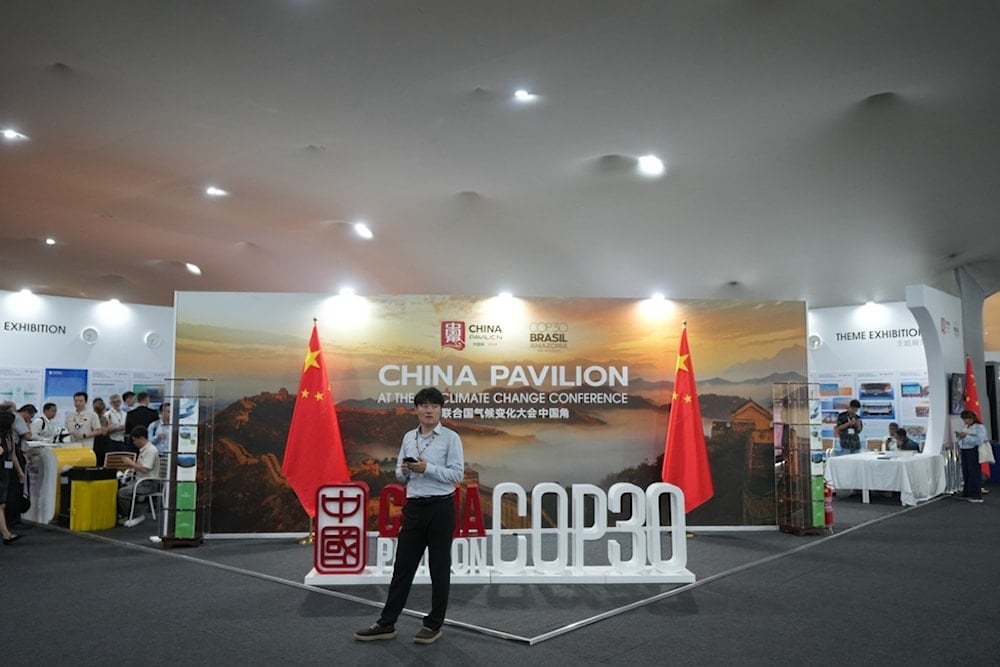US out, China in: Beijing fills in climate leadership at Brazil COP30
As the US skips COP30 for the first time in decades, China takes center stage in Brazil, pushing climate change efforts.
-

A person stands outside the China Pavilion at the COP30 UN Climate Summit, Thursday, November 13, 2025, in Belem, Brazil (AP)
With the United States absent from the UN’s annual international climate summit for the first time in three decades, China is stepping into a leadership role in the global effort to address climate change.
At COP30 in Belem, a city deep in Brazil's Amazon, China’s presence is unmistakable. Its national pavilion dominates the entrance to the sprawling summit grounds. Executives from its largest clean energy firms are delivering their visions in English to packed audiences, while Chinese diplomats quietly work to ensure productive negotiations.
"Water flows to where there is space, and diplomacy often does the same," Francesco La Camera, director general of the International Renewable Energy Agency, told Reuters. He added that China’s leadership in renewable energy and electric vehicles is reinforcing its position in climate diplomacy.
Read more: UN chief: Humanity has failed to contain global warming below 1.5°C
The shift comes amid a broader change in the global climate landscape following the return of US President Donald Trump, who has long expressed skepticism toward climate change initiatives. Once again, he has pulled the US, the world’s largest historic emitter, from the Paris Agreement. This year, no high-level US delegation was sent to COP30.
"President Trump will not jeopardize our country’s economic and national security to pursue vague climate goals that are killing other countries," White House spokeswoman Taylor Rogers told Reuters.
Critics warn that the US retreat opens the door for China to expand its influence in climate negotiations, especially as the world’s top greenhouse gas emitter aggressively grows its renewable and electric vehicle industries.
"China gets it," said California Governor Gavin Newsom during his visit to the summit earlier this week. "America is toast competitively, if we don't wake up to what the hell they're doing in this space."
From modest presence to pavilion powerhouse
Unlike past years, when China maintained a small, technical presence at the summit, its COP30 pavilion now occupies a prime location next to the host country, Brazil.
Visitors are drawn in with sustainable Chinese coffee, panda-themed merchandise, and daily presentations by senior officials and corporate leaders. One such official, Meng Xiangfeng, vice president of CATL, the world’s largest battery manufacturer, told attendees, "Let's honor the legacy and fulfill the Paris vision guided by the vision of a shared future. Let's advance climate cooperation and build a clean, beautiful world together."
CATL supplies around one-third of batteries for global EV producers, including Tesla, Ford, and Volkswagen. This marks the company’s first time hosting a COP event, aiming to engage governments and NGOs directly.
Read more: With 2.6°C temperature rise, planet tipping toward climate collapse
Clean energy, sustainability at heart of China’s push
China’s vice minister of ecology, Li Gao, addressed a full room, emphasizing the benefits of China’s renewable energy sector, especially for countries in the Global South.
Major state-owned enterprises like State Grid, along with solar giants Trina and Longi, also delivered presentations, showcasing Chinese leadership in sustainable technologies.
BYD, China’s leading electric vehicle manufacturer, introduced a new fleet of plug-in hybrids at COP30. Produced at its Bahia plant in Brazil, the vehicles run on biofuel and are being used at the summit.
COP30 President Andre Correa do Lago and CEO Ana de Toni both commended China’s role.
"China has shown leadership not only by carrying out its own energy revolution, but with China's scale capacity, we can now also buy low-carbon... at competitive prices," de Toni told Reuters.
She added that Beijing is taking practical actions to assist other nations, strengthening climate governance through its commitment to the Paris Agreement.
Beijing’s behind-the-scenes influence in climate talks
Beyond public presentations, China is playing a more subtle role in the negotiations themselves, helping fill the void left by the United States.
"Little by little, China is acting as a guarantor of the climate regime," Reuters cited a senior diplomat from an emerging economy as saying. "They invested a lot in the green economy. If there's any kind of involution, they will lose."
One Brazilian diplomat noted that China was instrumental in finalizing the COP30 agenda before negotiations began, a task it would have previously avoided unless directly impacted.
Sue Biniaz, a former US deputy climate envoy under John Kerry and a key figure in drafting the Paris Agreement, acknowledged China’s capacity to bridge developing world interests. She recalled their collaboration on four climate agreements, including the one that enabled the Paris deal.
"They tend to be very tough, take on tough positions like the US did, but then be pragmatic towards the end," Biniaz told Reuters. "They have to come up with an outcome that nobody thinks is bad enough to block."
Still, she expressed caution, suggesting true leadership would require stronger emissions targets. China’s current commitment is to reduce emissions at least 7% from their peak by 2035.
Li Shuo, head of the China Climate Hub at the Asia Society Policy Institute, argued that China’s growing clean technology sector is itself a demonstration of leadership.
"The most powerful country isn’t the one with the loudest microphone at COP," he said, "but the one actually producing and investing in low-carbon technologies."

 5 Min Read
5 Min Read









